#the mountain range really divides the province in half
Text
girl WHY am I spending so many hours researching stuff for a beyond evil story when it wouldn't even be relevant or obvious that I've spent this much time researching UGH
#bye I know so much about Gangwon-do now#literally like I know that they have daisies that were brought over in the early 1900s#also azaleas are like the provincial flower I think#Chuncheon is the capital but the second largest city#the mountain range really divides the province in half#Heechul is from Gangwon-do apparently#Hongcheon County's logo is so pretty its a flower with different colors representing different things about the county#there is a lot of Korean pine#and lots of rice cultivation because of the clean water and air I think#that rice... breed? is like resistant to diseases too so that's cool#why have I spent so much time doing this ugh I have a paper to write
2 notes
·
View notes
Text
Weather, Mountains, and Distance in China as Applied to the Módào Zǔshī Universe
I am a Foreign Teacher living in China and have been doing so for the last eight school years. For five and a half years I lived in Shandong Province, the same province as LanlingJin and I was a three and a half hour drive north of LanlingJin; a two to three-hour drive east and a bit south of LaolingQin; and a five to six-hour drive east and a bit north of QingheNie. For the last two and a half years I have lived in Jiangsu Province (barely) just two and a bit hours southwest of LanlingJin. But Jiangsu is the province of GusuLan and I am six hours north and a bit west of them; and not that anyone cares about MolingSu, but I’m four hours north and bit west of them. I have also travelled to every province, region, and territory that China says is China and most of those in January and February during Spring Festival Holiday. So from this experience I am going to discuss Chinese weather and a few other things that relate to the MDZS universe.
This ended up being way longer than I thought it was going to be. It was written to be read straight through. But as I’m pretty sure I’m the only one that cares and it goes through my thought process on the topic I have labelled each section so you can scroll down until you see the subheading you are interested in.
My Introduction to MDZS
My friend, told me about MDZS and the Untamed like 1 November 2019. I was at first skeptical as I have seen lots of Chinese shows playing in bars, at restaurants, or on long bus trips (the latter being where I’ve sort of had to see entire episodes and films) and generally Chinese TV shows are low on plot and have the same set character archetypes (not the point of this post so feel free to disagree, but I’m not here to argue). So honestly I was skeptical, but November is National Novel Writing Month, so even if I wanted to I hadn’t had the time. I also knew that I was going to be seeing said friend in Cambodia during Spring Festival Holiday and we would watch it then. Prior to going to Cambodia, I travelled with my Chinese friend Dean for eight days, but then he had to return home to spend Spring Festival with his family and I continued in my travelling.
I told Dean about how my friend was going to make me watch the Untamed and how it was based on a book and how it despite restrictions is still pretty gay. Dean didn’t believe me, but a couple days at home with nothing to do and plenty of wifi, and he had watched the Untamed before I could even meet up with my other friend!
Cloud Recesses in the Untamed - Mountains and Canal Cities
So that first scene where you see Cloud Recesses, I was like: oh I know those mountains! And my friend said that most of the places were really in China and sent me this map. As I continued watching well I was mostly caught up in the story but the snow kept bothering me, but there was never snow that stayed on the ground in the Untamed so I forgot it quickly. At a later rewatch I thought the Cloud Recesses mountains looked a lot like the mountains at ZhangJiaJie (the floating mountains that were the model for Avatar) in Hunan further west of where GusuLan is situated. According to the Untamed Wikipedia page the filming was done in Hengdian World Studios and Guizhou (also pretty far west). I am however a fan of climbing mountains and have climbed a lot of mountains in China, so I could be remembering mountains wrong.
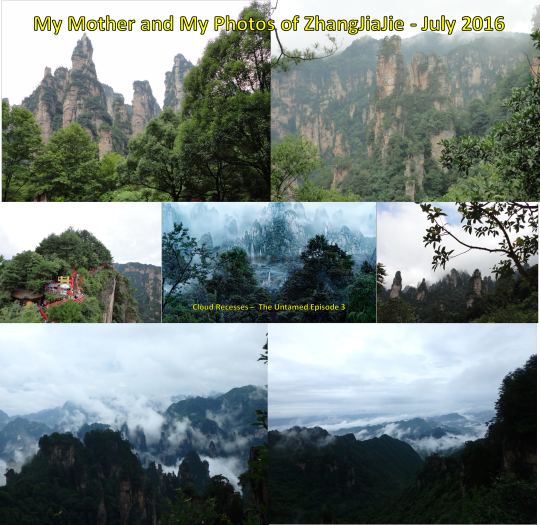
Where the questions came up was fanfiction. And I have never stopped reading a fic because they talked about a lot more snow then I had ever seen in the particular area of China. And Cloud Recesses having towering mountains as they depict from afar in both the live action and the donghua. When I’m watching the mountain is a back drop, but often fics make the mountains or snow part of the plot and it’s too late because I already think of Gusu being Suzhou a very famous canal city south of me and we get like once a year two cm of snow that lasts maybe two hours. And the translator’s note at the end of Refinement Part 1 says that Cloud Recesses got its name from a phrase of Jia Dao’s poem, not the height of the mountains.
In general, I know that a lot of English fic writers just didn’t know the weather in China or perhaps hadn’t seen the map that showed you where everything in China was situated. And were using context clues like the disciples of YunmengJiang laying topless on floorboards in the summer heat in the extras from the book or the snow seen in both the Untamed and MDZS the donghua. And I had brushed it off as artistic license the height of the mountain of Cloud Recesses bugged me and made me do research for my own personal piece of mind.
I will admit I have not been to Suzhou, I skipped it when I was being a tourist in Jiangsu Province as the internet said it was a big tourist spot and could be very crowded, so I chose to go to a different canal town. Then I moved to Xuzhou in Jiangsu. And in Chinese the biggest thing is said first so I would have to say in Chinese when asked where I was moving to or later where I lived: Jiangsu, Xuzhou. The other thing I didn’t know despite having studied Chinese in college, that I learned from Dean when I complained about this problem is that all Yu (Yu, Yue, Yun, Yuan) and Xu (Xu, Xue, Xun, Xuan) no matter the tone are pronounced with a umlaut on the u so: Yü, Yüe, Yün, Yüan, Xü, Xüe, Xün, and Xüan. So, despite the fact that I pronouncing (disregarding tone for the following examples, and written by use of correlating English words and names) Xuzhou as Shoe-joe every Chinese person thought I said Suzhou (which I would say as Sue-joe). So, I heard a lot of: “Suzhou?! It’s so beautiful! And with all the water!” never anything about mountains.
Now, Guilin, Guangxi is a city that is absolutely gorgeous and has a lot of mountains, there is one called the Solitary Beauty Peak (152m), which is literally a vaguely rectangular mountain, with very sheer faces (and steep stairs carved in to get to the top), in the middle of a very flat expanse (behind the yellow building in the picture - January 2014).
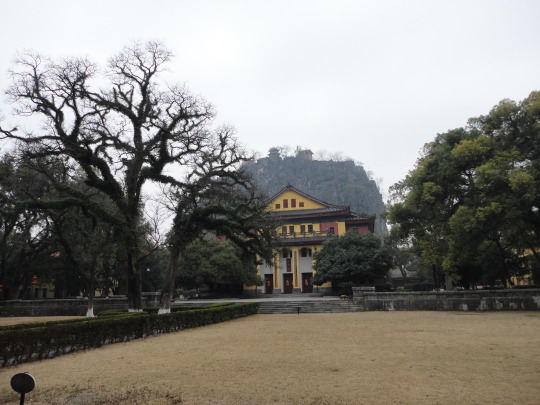
Which means that similar mountains could be in Suzhou. And Gusu was named after Gusu Mountain so I did an exhaustive search with multiple map apps, google, and baidu to find the mountains in Suzhou and their heights. In the end the mountains in Suzhou are not very tall.

Practical Experience with Snowfall in China
My first year in China my city got snow in December, maybe about 10 cms, but it was cold enough that it didn’t melt; and so we had snow for pretty much the whole winter with a sprinkling of a couple more cms added here and there. That year, I went to the Great Wall in the winter and signed up to go to Mutianyu a section of the wall pretty far from Beijing (north of all places in MDZS), but we couldn’t get to it due to snow, so we went to another section, Juyongguan, which wasn’t snowed out and it didn’t have too much snow on it maybe just a couple cms of snow built up in corners of steps and the like. That was the last time we really got snow that stayed. A few years later we got maybe a few cms but not a lot of snow. When I went to Sichuan (in 2014; where MeishanYu is) I remember leaving the Chengdu airport in a car and looking out the window to see snow dusted palm trees, something I had thought I really wouldn’t have ever seen, but that was probably the most snow that I had seen for that trip. The 12th edition of the China Lonely Planet book does state that the canals of Suzhou are very beautiful covered in snow in December. But based on how I’ve seen less snow further north than Suzhou makes me wonder how consistent it is.
Temperatures on Mountain Tops in China
I went to Ürümqi, Xinjiang the very tail end of June in 2019. July is the hottest time in Xinjiang and the temperature while I was there was generally about 30-45°C. One day I went to Tian Chi a lake in the Heavens Mountain (Tianshan) range, the lake is below the Peak of God (Bogeda Feng) that according to my Lonely Planet is a 5445m peak. Which now that I’m looking at the book, I know I hadn’t before going to Ürümqi, because the book says to bring warm clothing and I hadn’t. I took a tour bus up to the lake (I think that is the most common option. And around the lake it didn’t feel as hot as it was down in Ürümqi and when I went to take the cable car most of the way up Bogeda Feng, I remember seeing winter jackets for rent. At that moment I thought it was strange and pointless in the warmest time for the area despite that it was definitely getting chilly enough that I put on the light jacket (that prior to that point was mainly for sun protection) on. When I got out of the cable car near the top it was definitely cold. Many of the other hikers were in winter jackets and as you climbed up to the peak your breath definitely misted like it was winter! But that is the only time that has happened to me climbing mountains in China. I climbed Huangshan a mountain in Anhui, west and a bit south of Gusu. It has an elevation of 1873m and I climbed it in May, and there was no discernible temperature difference between the top and the bottom of the mountain.
The Yangtze River – divider of whether your home is heated or not
The Yangtze River is what China uses as a divider of north and south China. In the present day this is seen as whether or not your home gets central heating in the winter. When I lived in Shandong province (north of the Yangtze), the central heating was turned on 1 November and turned off the 1 March (I think, I’m remembering that correctly). Each province decides how cold it is and for how long and has different rules for central heating. No matter what you don’t have control over the temperature of the central heating, and everyone has to survive with an AC/Heating mounted wall unit, and/or portable heaters.
Jiangsu is a province that the Yangtze cuts through, which means you might get central heating. I moved to Xuzhou, which is spitting distance to Shandong province, in May (I got transferred to cover a sick teacher). So I was put up in the teacher’s housing on the college campus, and it did have central heating, the flat also had screened in windows above the doors that didn’t have glass and therefore would be open year-round. When I said I wanted to stay in the city and teach for the next year I got an off-campus flat in a community maybe 1.5 kms down the road—no central heating. Fall 2019 my community was offered central heating, we would have had to pay to get it installed, and it would only be installed if enough people said yes because it would be done for the whole community at that point. If we got the central heating it would have only been turned on December-February, and as the Spring Festival break at the school was an entire month it wasn’t worth it. And that time I went to Sichuan (everyone says south, but I think it has a bit of the Yangtze in it) all the restaurants were open fronted with no solid doors at all. Though the AC/Heating mounted wall unit in my hotel room (a small hotel outside of the city proper with a squat toilet in the bathroom (I’ve only seen squat toilets in two Chinese hotels)) was the best heater ever. My hotel room was so much warmer than any flat I’ve had in China, because even if it was a cheap hotel the AC/Heating mounted wall units needed to work well in Sichuan because it was the only source of heat.
MDZS Cities on the Yangtze and Old Names for the River
So west to east the cities that are close/on the Yangtze are: Meishan - north, Kuizhou - north bank, Yiling - north bank, Baling - south bank, Yunmeng - north, Moling south (the Yangtze goes through Nanjing so maybe it has bank space), and Gusu - south (possibly in the delta).
According to the Yangtze Wikipedia Page, which I have kept open in a tab in Firefox for reference since I started writing fic—People in Ancient China didn’t realise that the river was a single river and therefore each section of the river, had its own name and was thought to be its own river (the following is mostly just copied from Wikipedia).
For Meishan, Kuizhou, and Yiling, the river through Sichuan and Chongqing Municipality was known as the Chuan Jiang (川江; Chuān Jiāng) or "Sichuan River." The Wikipedia page specifically states that Yichang modern day Yiling as the last/most eastern city to call the Yangtze thus.
In Hubei, this would be Yunmeng and Yiling, but Yiling followed the pattern of the places further west. And I’m going to assume Baling despite being in Hunan; the river is also called the Jing Jiang (荆江; Jīngjiāng) or the "Jing River" after Jingzhou.
In Anhui (which has no sects), the river takes on the local name Wan Jiang after the shorthand name for Anhui, wǎn (皖).
For Gusu and Moling, it was the Yangzi Jiang (揚子江; 扬子江; Yángzǐjiāng) or the "Yangzi River," from which the English name Yangtze is derived, is the local name for the Lower Yangtze in the region of Yangzhou. The name likely comes from an ancient ferry crossing called Yangzi or Yangzijin (揚子 / 揚子津; Yángzǐ / Yángzǐjīn). Europeans who arrived in the Yangtze River Delta region applied this local name to the whole river.
The dividing site between upstream and midstream is considered to be at Yichang (Yiling) and that between midstream and downstream at Hukou (Jiujiang).
Winter Weather in Terms of Whether or Not Long Underwear Should be Worn in Various MDZS Cities
Another way to think of it is in terms of long underwear. I wore long underwear in my city in Shandong province, the pants, and a long undershirt. Typically, three layers on top when indoors, maybe with a fourth sweater when the room I was in wasn’t heated and thick socks over regular ones. In Xuzhou I wore maybe the long underwear bottoms but not the top because my classroom actually has a heater in it, but I usually wore a sweater. When I visited Xi’an, Shaanxi (YueyangChang and 2hrs west of QishanWen), Nanjing, Jiangsu (MolingSu), and when I went to Chengdu, Sichuan (1.5 hours north of Meishan) I wore long underwear (though it was particularly cold that year in Chengdu). When I went to Hangzhou, Zhejiang (south of TingshanHe; Tingshan is hard to pinpoint), Changsha, Hunan (2 hours south of BalingOuyang), and Wuhan, Hubei (3 hrs north of BalingOuyang and 1.25 hours south of YunmengJiang) I had long underwear with me but didn’t necessarily wear it. I do remember in Wuhan this tree that had little pink blooms on it at the end of January. I didn’t have long underwear with me when I went to Chongqing, I could have sworn I actually went to Kuizhou Ancient City (or another Ancient City/Street) but I can’t find pictures from it. The city I visited before Chongqing, I visited an ancient city so I could be mixing these up. But I remember it being Chongqing and getting a foot massage in an open-air shop in an ancient street and being covered in blankets because it was pretty chilly.
Comparative Temperatures based on their North Parallels
I live in Maine in the US, so a place with lots of snow. When I first came to China my family and I were looking at the map and thought that Maine and my city in Shandong looked to be in a line so the weather would be similar—it wasn’t, but it is a good theory; and something I spent a lot of time thinking might be sound as Maine and Shandong province aren’t on the same parallels so I thought there was still a chance that it would correlate elsewhere. The two most northern sects QingheNie at 37°04’ and LaolingQin 37°26’, according to Wikipedia, which continues to tell me that other notable places on the 37th parallel. The 37th parallel separates out Utah, Colorado, and Kansas on the north side from Arizona, New Mexico, and Oklahoma on the South. It also passes through the Mediterranean Sea; the Aegean Sea; the Caspian Sea; the Sea of Japan; the Yellow Sea; just south of Antequera, Spain; the island of Sicily, Italy; the island of Honshū, Japan; Gilgit-Baltistan, Pakistan/India; and through Algeria, Tunisia, Turkey, Iraq, Iran, Turkmenistan, Afghanistan, Tajikistan, and South Korea.
I just moved to Zhengzhou, Henan (34°45′50″N), when I asked about the weather I was told it was comparable to Washington DC (38°54′17″N). I keep getting told that Zhengzhou is the centre of China and it is kind of the centre of where all the sects are: north 1.5 hours from YingchuanWang and 5.5 hours from YunmengJiang; south 3.5 hours from QingheNie; and east 6 hours from YueyangChan.
Conclusion for Winter Weather in Gusu and Summary of Chinese Summers
So, based on my experiences, any of the mountains in Suzhou just wouldn’t have a discernible temperature difference from the top of the mountain and the bottom of the mountain. And despite “Snow-covered views of the pretty canal towns of Suzhou in winter” I would assume that it doesn’t actually get that much snow.
So enough about how cold and snowy China is, summer-wise it is generally too, too hot. For the level of cold in the winter, I would have assumed there would be milder summers but where I have lived and visited that has not been the case. When I asked the teacher I was replacing in Shandong about the weather of the city I was told that it went from ‘freezing your pants off to fucking hot’ and it was true one day you’d be wearing a jacket and maybe for a week you’d be in jeans and a tee and then you’d be sweating while wearing the least amount of clothing possible. I’ve definitely seen 30°C days in May.
Rundown of the Climate, Average Temperatures, Rainfall, and Humidity for all MDZS Cities
So you don’t have to here is what Wikipedia says about the climate of the cities of the different areas so you don’t have to look it up yourselves (pretty much copy and pasted):
Baling – (is present day Yueyang different characters and city from the YueyangChang Sect seat). The average high for the year is 21°C/69.7°F and the low 14.9°C/58.8°F. January being the coldest month with an average low of 2.7°C/36.7°F and an average high of 8.1°C/46.6°F. July is the hottest month with an average low of 26.6°C/79.9°F and an average high of 32.2°C/90°F. Average humidity ranges from 73% in December to 79% in June (with a yearly average of 77%). The most average rainfall is in June, the rain heavy months being April-July, compared to the remaining months March and August also have a lot of rain.
Gusu - has a four-season humid subtropical climate with hot, humid summers and cool, cloudy, damp winters with occasional snowfall (Köppen climate classification Cfa). North-westerly winds blowing from Siberia during winter can cause temperatures to fall below freezing at night, while southerly or south-westerly winds during the summer can push temperatures above 35 °C (95 °F). The average high for the year is 19.9°C/67.8°F and the low 12.5°C/54.5°F. January being the coldest month with an average low of 0.5°C/32.9°F and an average high of 7.7°C/45.9°F. July is the hottest month (by 0.1°C over August) with an average low of 24.8°C/76.6°F and an average high of 31.6°C/88.9°F. Average humidity ranges from 65% in November to 77% in July (with a yearly average of 71%). The most average rainfall is in September, the rain heavy months being June-September, April (102.3 mm) and May (114.5) are petty rainy too, May is still 14mm less rain then July (the lowest of the high rain months).
Kuizhou - has a humid subtropical climate (Köppen Cfa), bordering on a monsoonal humid subtropical climate (Köppen Cwa) and for most of the year experiences very high relative humidity, with all months above 75%. Known as one of the "Three Furnaces" of the Yangtze river, its summers are long and among the hottest and most humid in China, with highs of 33 to 34 °C (91 to 93 °F) in July and August in the urban area.Winters are short and somewhat mild, but damp and overcast. The city's location in the Sichuan Basin causes it to have one of the lowest annual sunshine totals nationally. With over 100 days of fog per year, is known as the "Fog City" The average high for the year is 22.1°C/71.8°F and the low 15.8°C/60.4°F. January being the coldest month with an average low of 6.2°C/43.2°F and an average high of 10.3°C/50.5°F. August is the hottest month (by 0.2°C over July) with an average low of 24.7°C/76.5°F and an average high of 33.2°C/91.8°F. The most average rainfall is in June, the rain heavy months being June and July, but May and August are petty rainy too.
Lanling - has a monsoon-influenced climate with generous summer precipitation, cold, dry winters, and hot, humid summers. Under the Köppen climate classification, it is in the transition from the humid subtropical zone (Cwa) to the humid continental zone (Dwa), though favouring the former. More than half of the annual precipitation of 833 mm (32.8 in) falls in July and August alone, and the frost-free period is above 200 days. The average high for the year is 19.1°C/66.3°F and the low 9.5°C/49.1°F. January being the coldest month with an average low of -4.3°C/24.3°F and an average high of 4.4°C/39.9°F. July is the hottest month (by 0.7°C over August) with an average low of 23°C/73.4°F and an average high of 30.7°C/87.3°F
Laoling - The average high for the year is 19.3°C/66.7°F and the low 9.4°C/48.9°F. January being the coldest month with an average low of -5.6°C/21.9°F and an average high of 3.4°C/38.1°F. June is the hottest month with an average low of 20.2°C/68.4°F and an average high of 32.1°C/89.8°F. Average humidity ranges from 52% in March to 78% in August (with a yearly average of 63%). The most average rainfall is in July, the rain heavy months being July and August by quite a margin. July has on average 90 mm more rain then June (the month with the third highest rainfall).
Meishan - The average high for the year is 21.3°C/70.3°F and the low 14.3°C/57.7°F. January being the coldest month with an average low of 4.1°C/39.4°F and an average high of 10.1°C/50.2°F. July is the hottest month (though the record high temperature was in August) with an average low of 22.9°C/73.2°F and an average high of 30.7°C/86.5°F. Average humidity ranges from 74% in May to 84% in January, August, October, and December (with a yearly average of 81%). The most average rainfall is in August, the rain heavy months being July and August, June (144 mm) and September (130.4) are petty rainy too, June is still 87mm less rainy then July (the lowest of the high rain months) and September gets 42.5mm more rain than the 5th rainiest month—May.
Moling - has a humid subtropical climate (Köppen Cfa) and is influenced by the East Asian monsoon. The four seasons are distinct, with damp conditions seen throughout the year, very hot and muggy summers, cold, damp winters, and in between, spring and autumn are of reasonable length. Known as one of the "Three Furnaces" along the Yangtze River for the perennially high temperatures in the summertime. However, the time from mid-June to the end of July is the plum blossom blooming season in which the meiyu (rainy season of East Asia; literally "plum rain") occurs, during which the city experiences a period of mild rain as well as dampness. Typhoons are uncommon but possible in the late stages of summer and early part of autumn. The annual mean temperature is around 15.91 °C (60.6 °F), with the monthly 24-hour average temperature ranging from 2.7 °C (36.9 °F) in January to 28.1 °C (82.6 °F) in July. Extremes since 1951 have ranged from −14.0 °C (7 °F) on 6 January 1955 to 40.7 °C (105 °F) on 22 August 1959. The average high for the year is 20.6°C/69.1°F and the low 12.1°C/53.8°F. January being the coldest month with an average low of -0.7°C/30.7°F and an average high of 7.2°C/45°F. July is the hottest month with an average low of 24.9°C/76.8°F and an average high of 32.2°C/90°F. On average precipitation falls 115 days out of the year, and the average annual rainfall is 1,090 mm (43 in). The most average rainfall is in July, the rain heavy months being June through August. August (143.5mm) is the least rainy of the three and still gets on average 52.8 mm more rain then May the 4th rainiest month. July has the most days of rain (12.3), but both March (only 80.4mm) and August have the second most days of rain (11.8).With monthly percent possible sunshine ranging from 37 percent in March to 52 percent in August, the city receives 1,926 hours of bright sunshine annually. Average humidity ranges from 71% in April and May to 80% in July and August (with a yearly average of 75%).
Qinghe - has a continental, monsoon-influenced semi-arid climate (Köppen BSk), characterised by hot, humid summers due to the East Asian monsoon, and generally cold, windy, very dry winters that reflect the influence of the vast Siberian anticyclone. Spring can bear witness to sandstorms blowing in from the Mongolian steppe, accompanied by rapidly warming, but generally dry, conditions. Autumn is similar to spring in temperature and lack of rainfall. The annual rainfall, more than half of which falls in July and August alone, is highly variable and not reliable. The average high for the year is 19.6°C/67.2°F and the low 8.8°C/47.9°F. January being the coldest month with an average low of -6.1°C/21°F and an average high of 3.9°C/39°F. June is the hottest month with an average low of 20.2°C/68.4°F and an average high of 32.1°C/89.8°F
Qishan - The average high for the year is 18.5°C/65.3°F and the low 9°C/48.1°F. January being the coldest month with an average low of -3.5°C/25.7°F and an average high of 5.1°C/41.2°F. July is the hottest month with an average low of 21.1°C/70°F and an average high of 30.9°C/87.6°F. The record high temperature from (1971-2000) in January was 20.7°C/69.3°F which is the lowest of the record highs. The highest was in August at 41.6°C/106.9°F. The most average rainfall is in August but had the most days of rain in September (the rain heavy months being June-September).
Tingshan - The average high for the year is 20.5°C/68.9 °F and the low 13.1°C/55.6°F. January being the coldest month with an average low of 0.9°C/33.6°F and an average high of 7.5°C/45.5°F. July is the hottest month with an average low of 25.3°C/77.5°F and an average high of 32.6°C/90.7°F. Average humidity ranges from 75% in April and May to 82% in September (with a yearly average of 78%). The most average rainfall is in June, the rain heavy months being June-August, March (121.2 mm), May (113.4mm), and September ( 109mm) are petty rainy too, March still has 34.2 mm less rain then August (the lowest of the high rain months). March also has the most days of rain (15.2), followed by June (14.8), then April and July (13.7).
Yiling - has a four-season, monsoon-influenced, humid subtropical climate (Köppen Cwa), with cool, damp and generally overcast winters, and hot, humid summers. The monthly 24-hour average temperature ranges from 5.0 °C (41.0 °F) in January to 27.7 °C (81.9 °F) in July, while the annual mean is 17.08 °C (62.7 °F). The average high for the year is 21.6°C/70.9°F and the low 13.7°C/56.6°F. January being the coldest month with an average low of 2.2°C/36°F and an average high of 8.8°C/47.8°F. July is the hottest month with an average low of 24.3°C/75.7.°F and an average high of 32.3°C/90.1°F. Close to 70% of the annual precipitation of 1,160 mm (46 in) occurs from May to September. The most average rainfall is in July, the rain heavy months being June-August; May (124.4mm), and September (115.3mm) are petty rainy too, May still has17.8 mm less rain then June (the lowest of the high rain months). July has the most days of rain (15.1), followed by June (14.1), then May (13.5).With monthly percent possible sunshine ranging from 24% in January to 49% in August, the city receives 1,568 hours of bright sunshine annually, and summer is the sunniest season. Average humidity ranges from 73% in February, March, April and December to 80% in July (with a yearly average of 75%).
Yingchuan - has a monsoon-influenced humid subtropical climate (Köppen Cwa), with four distinct seasons. Winters are cool and dry, summers hot and humid, spring begins early and is warm, and autumn is mild and provides a reasonable transition. Rain mainly falls from May to September, as more than 70% of the annual precipitation occurs then. The city has an annual mean temperature of at 14.5 °C (58.1 °F), and its highest average monthly temperature is 27.1 °C (80.8 °F) in July and the lowest is 0.7 °C (33.3 °F) in January. Just over 700 millimetres (28 in) of precipitation falls each year, and there is on average 217 frost-free days and 2280 hours of sunshine per year. The average high for the year is 20.2°C/68.4°F and the low 9.7°C/49.5°F. January being the coldest month with an average low of -3.6°C/25.5°F and an average high of 6.1°C/43°F. July is the hottest month (by 0.2°C over June) with an average low of 23.1°C/73.6°F and an average high of 32°C/89.6°F. The most average rainfall is in July, the rain heavy months being July and August; June (83.5mm) is petty rainy too, but June still has 38.2mm less rain then August (the lowest of the high rain months). July has the most days of rain (11.7), followed by August (10.6), then June (8.4).
Yueyang - has a temperate climate that is influenced by the East Asian monsoon, classified under the Köppen climate classification as situated on the borderline between a semi-arid climate (BSk) and humid subtropical climate (Cwa). The Wei River valley is characterised by hot, humid summers, cold, dry winters, and dry springs and autumns. Most of the annual precipitation is delivered from July (on average has the most rain) to late October with September having the most days of rain. Snow occasionally falls in winter but rarely settles for long. Dust storms often occur during March and April as the city rapidly warms up. Summer months also experience frequent but short thunderstorms. The average high for the year is 19.5°C/67.1°F and the low 9.7°C/49.5°F. January being the coldest month with an average low of -3.3°C/26.1°F and an average high of 5.1°C/41.2°F. July is the hottest month with an average low of 22.3°C/72.1°F and an average high of 32.4°C/90.3°F. Average humidity ranges from 61% in June to 77% in September (with a yearly average of 68%)
Yunmeng - The average high for the year is 21.1°C/70°F and the low 12.8°C/55.1°F. January being the coldest month with an average low of 0.2°C/32.4°F and an average high of 3.9°C/39°F. July is the hottest month (by 0.2°C over August) with an average low of 25.2°C/77.4°F and an average high of 32.2°C/90°F. Average humidity ranges from 75% in December to 83% in July (with a yearly average of 79%)
Dafan Mountain and Phoenix Mountian
That being said, I was trying to find Dafan Mountain on a map for a fanfic I was writing. I have a Chinese copy of MDZS and I was originally having trouble finding the characters used for Dafan Mountain. When I did, Baidu was not at all helpful every webpage was for MDZS and/or CQL. So I asked Dean who replied that he didn’t know, as the places in the book are all made up, at which time I sent him a copy of the map that my other friend had shown me with the actual names of the present day cities for the five main sects. And I did a search for “where is Dafan mountain” which worked for things like: “where is Moling”, for the Dafan search the results were things like which chapter/episode is Dafan or ‘where was Wen Ning before Dafan?’ My confusion came from the fact that the town below Dafan is called Buddha’s Feet—and I have been there. In Chongqing there is a district called Dazu (大足), Buddha’s Feet which had Buddhist cave paintings so there are also mountains. Edit: I went back and looked for pictures, it’s not actually very mountain-y and is named for some giant footprints.

It took longer to find, because as I had learned there is just too many ways that you could write Buddha’s Feet in Chinese and have it interpreted as Buddha’s Feet. In the book it is called 佛脚镇 (Fójiǎo Zhèn) or Buddha’s Foot town, which isn’t a real place in China according to Baidu. So for my own fic purposes I decided that it was going to be in Chongqing. And then later, when I was actually putting together a map on Google I double checked for places like Dafan and found one. 大梵山 Dafan Shan (same characters and everything) is a 207m mountain in South Korea called Keun Beom San (?) 큰범산.
Phoenix Mountain was another one that I had a hard time looking for in the book as there are multiple ways to say Phoenix in Chinese and it is generally a compound word including Feng (风) which usually means wind and the name of the mountain in Chinese is 百风山 (Bǎifèng shān) and could also be translated as the Hundred Wind Mountain. And all though it sounds like a very good mountain name ‘phoenix’ or ‘wind’-wise there is no such mountain that I could find.
My Own Map Making Explained
Before I made my own map I looked for other maps online, ones that talked about the smaller sects. For the purposes of my fic I needed to know where the YueyangChang clan was situated, and where Xue Yang would be, or coming from, or going to. I found this map online. It is a very good map but it uses the present day name instead of the book names so I got super confused. For example that map has a Liyang, Leling, and Yueling, none of which I could find on the MDZS wiki as being connected to a sect.
What I ended up doing is writing the names of the cities into Pleco, a Chinese-English dictionary app, so if I type in yueyang the first three are: Yuèyáng (岳阳) a prefecture-level city in Hunan; yuèyáng (越洋) a verb meaning cross the ocean; and yuè yáng (栎阳) a place in Shaanxi Province. I took the place names and searched for them in my Chinese copy of the book and hit on 栎阳. Then I put it in Baidu, Baidu Maps, and Apple Maps to see where it would turn up—it turned up in Xi’an. Well, Liyang from that second map is also 栎阳. And when I look at the map apps with pinyin the section of Xi’an in question is also labelled as Liyang.
Leling was harder—or easier I guess it depends on how you look at it. I ended up looking it up straight from the second map Pleco suggested 乐陵 the county level city in Dezhou, which I found in the book 乐陵秦—LaolingQin. This I don’t understand at all 乐 is lè or yuè and yet we call them LaolingQin. So there you have it. Edit: while writing the weather section (which I did after this though it comes first in the post) I A. realised I’d been writing Yaoling instead of Laoling and B. that the Laoling County-level City Wikipedia page said that Laoling often gets mispronounced as Leling because the character 乐 is only ever elsewhere lè or yuè.
Tingshan was the last one that gave me problems. It is written 亭山 and there are actually a couple mountains called Tingshan, with the same characters one near Qufu in Shandong province, and two in Zhejiang province one north of Hangzhou and the other sort of south of Hangzhou, in Shaoxing (the one that comes up the most often in Baidu searches). Then I found a Chinese site discussing the ancient city of Tingshan City which is “In today's Zhejiang Deqing County East 24 Li (1 Li = 0.5 km)” so I put Deqing county on my map and then realised that the same site says that Tingshan is also 200 paces southwest of the county and then mentions a Wuxing ji (吴兴记) but I could find a Wuxing District (吴兴区) of Huzhou City the same city as Deqing county. Wuxing was north east of Deqing and that was when I realised that the two possible dots of Tingshan on my map were close to the dot of Yueling on the second map I had found. And I found a Yueling (越岭) in Huzhou and it was southwest of Wuxing (not sure about 200 paces or not), so I differed to the wisdom of that second map.
I have made my own map with the labels of all places I could find on a map. I labelled them with the sect names or if they had no sect associated with them just the city name. Sadly Baixue Temple, Phoenix Mountain, Dust Creek Mountain, Mo Village, and Dafan Mountain/Buddha’s Feet (though my map does include Dazu in Chongqing, as a point of interest) could not be found and added to the map. And of course we have no clue where Sect leader Yao came from and I kind of wish we could send him back off into the nothing, but he is there to add strife I suppose.
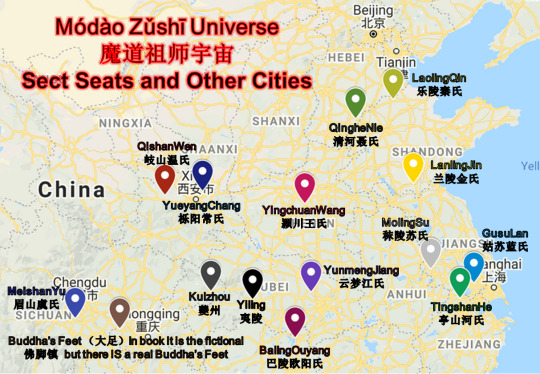
River Travel- Lotus Pier wasn’t the closest Sect to Yiling
I got to a part in my own fic where I needed them to take a bout between Yiling and Yunmeng and realised that while Yiling is on the Yangtze, Yunmeng is not and instead is on a tributary of the Yangtze. I did a cursory search for ancient river boat speeds and found an archaeological paper that tested seven ancient boats one of which was a Singapore Sampan it wasn’t very fast. So I just decided to write it off as cultivating boats get people there faster.
Even though I had already wrote the boat scene of my fic when I was looking at my map I noticed Google’s measuring tool. So for fun, I used the Google Maps measuring tool to measure river distance between Yiling and Yunmeng after I put all the city markers on. Yiling is on the Yangtze and Yunmeng has a couple Yangtze tributaries that run through it that meet up in the Wuhan area. The Yangtze dips south after Yiling and then goes back up to Wuhan. Yiling to Yunmeng is 444 km by river if you leave the Yangtze by Jingzhou and travel through Chang Lake (I cheated and connected to Hanshui River with what looks like a manmade river, maybe, it is very straight and appears to cut through the lake) then it is a lot of small rivers to get to Yunmeng. I thought maybe even though the Yangtze goes further south and Wuhan is further east than Yunmeng since it is a bigger river it might still be shorter. However, 397 km east of Yiling following the Yangtze in Baling! I remember in CQL Sect Leader Yao suggests Lotus Pier after the second siege of the Burial Mounds (I might be remembering wrong), but well he appears friendly with Ouyang, and they are a smaller sect.
Conclusion
So, while the sects live in actual places, today they are generally just districts in larger cities, because the urbanisation of China has resulted in many villages becoming districts of bigger cities. And while some of the places in the book are made up (Yunping City being another one that I cannot find anywhere) they are reasonably named that they are not far outside of the realm of possibility. Also China is a large country that discourages people from moving around, as you always have to return to the place of your birth (or your parents’ birth) to get paperwork and the like for visas, etc. Therefore, I believe perhaps inside China the knowledge of where these places are or the height of their mountains or their amount of snow is not something that is thought about by people as much as I think of these things.
#mdzs#cql#the untamed#china#weather#maps#mountains#yangtze river#mo dao zu shi#cloud recesses#geography
27 notes
·
View notes
Text
Guardian Original Novel- Bonus Chapter Four - Finished on 2018/07/30 by Priest - P1
【Interpreter note: Token of Soul Suppression : Whoever have their names written on the token, will be a servant. They will have connection with the token, and have to follow commands from the master - Zhao Yunlan, God of Mountain KunLun.】
(I)

"... ... Here, click here, and then set up a pin number for payment." Zhao Yunlan handed a cell phone to Shen Wei, but not until Shen Wei took over, he changed his mind, set up a pin himself instead, "Never mind, I'll do it, you are too easy to guess."
Professor Shen is a very persistent person, all of his password were their door number, he has no awareness of security.
Shen Wei is a very detailed and decent man. After the battle, his focus was shifted from worrying about the Triple Realm to the arrangement of clothing, diet, housing, and traveling, these are so easy and effortless for him.
In the past, Shen Wei really didn't care to plan his life style. In troubled times, he would find a spot in the forest or mountain to hide. If the world was in the heyday of peace, he would look for an apartment and live a simple life. He wandered around the world for so long, honest and clear, has no deposit, not to mention of buying a property. So far, he has only a checking account for his salary, he is basically a normal middle-class man.
As for the famous mountains and rivers he inherited from KunLun, are in charged by the National Tourism Development Department, have nothing to do with him. He can't have the share of the fares or tickets.
"Look, I'll show you how to send out a Red-pocket here." Zhao Yunlan reached out and hooked over Shen Wei's shoulders, ruined his dignified sitting position. He took the chance of sharing personal experience, sent a red-pocket to himself, and he was quite satisfied with that. "Congratulations! The last old fogey of this century just stepped into Mobile Pay. ... .... What, again!"
Before he finished, his phone rang, Zhao Yunlan looked at the screen, didn't want to pick up, so he flipped the phone facing down. The phone rang for three times, but whoever was calling not going to stop, his office phone started to ring. Zhao Yunlan stretched his leg, poked Qing over the armchair, "Yo, fatty, pick it up."
Since Shen Wei was still sitting there, Qing held down his tamper. He jumped on the deck, treated the handset as Zhao Yunlan's face, slammed it off, "Hello, Special Inve.... Ah? HAHA, how are you Old Chief Zhao?Oh you're looking for the Chief Director? He just told me he's not here."
Zhao Yunlan:"... ..."
He looked at his phone, all three phone calls were not from the same person, the last two were from his father. He moved towards the phone unwillingly, "What's wrong with these monsters! Are they all right?! Going to my dad to pull a freaking string!"
Special Investigation Department, as is "Soul Suppression Unit", in the very beginning, it was like a "daycare", and a "Labor reformation + social working shelter".
In this department, except for Guo ChangCheng - a real human, and Wang Zheng- Sang Zan and other ghost-form officers that were taken in by Zhao Yunlan, the rest of the crew members could be divided into two types: Type one, for example Zhu Hong and Lin Jing, these were sent in here to accumulate experiences; Type two, Chu Shuzhi, a former prisoner. The Soul Suppression Unit was established to coordinate among the Triple Realms, and to guard the peace of the human world. Their daily life are to wipe behind those criminals who committed crimes, under the condition of complying with protocols, laws and regulations. This job alone was not a easy piece of cake, plus the director was a normal-looking young man, so there was never any talented person volunteered to join.
But the status quo was very different now. Ever since the barrier was devastated, the four Holy Items were re-arranged, the grand reincarnation was established, the Lord of Ghost ascended and became a celestial, and God KunLun returned to his rightful position, these facts might be secrets to mortal human, but not to the other forms of lives. After the battle night, the SID that no one cared, became the hottest issue. Everyone tried to step in to get some celestial blessing. It turned so annoying that Zhao Yunlan had to turn them down by telling them "There are not enough space for too many names on the Token of Soul Suppression (Note: A tree bark from the divine tree grown on top of Mountain KunLun)."
The token doesn't have enough space, but SID does. The SID is an administrative facility, founded by the government.
So, in order to get connection with SID, some smart pants started to lobby for reformation, and eventually they succeeded. SID was upgraded into "Special Investigation Administration Department - SIAD". Now there are agencies in different provinces, quite organized.
The "Section Chief Zhao" who was lying in the loft of 9th University Blvd all day long, thus inexplicably became "Chief Director Zhao".
This was the first year of opening for application after the reformation. Zhao Yunlan who was indulged in gardening and peaceful happy life, was directed by authorities to take over the recruitment. Sure won't have their names engraved on the token, but doesn't mean Zhao Yunlan wants some losers in his agencies, he had enough losers already. The whole department was shorthanded, so public recruiting was not a option. He sent out limited quantities of applications to different species, left the tough qualify selection to their leaders.
To get some extra applications, apparently some "talented people" had figured out shortcuts.
"Yes?" Zhao Yunlan picked up the phone and answered very sluggish, "What. You already retired, can't you just spend more time on dancing with those old ladies. Don't waste your time and energy on my career. Who called you anyway?! Errrrr... ... "
Qing lifted his ears, a rambling monologue boomed out from the other side of the line. At the beginning, Zhao Yunlan was trying to interrupt his father, "No, I did not. No, not at all", that didn't work out. Later, he decided to give up his resistance. He leaned to the desk, relaxed his leg, looked up the ceiling and then all the way down to Shen Wei's clean cuffs. He suddenly started to miss Med-Bowl, as least he never give so much lecture.
His dad, a retired Director, recently had been frequently visited, very angry after he found out why. Year of 2018 already, these people visited him just for a stupid job application form. What a stupid idea! That was why he called in to lecture Zhao Yunlan.
Zhao Yunlan answered very careless:"Yes, I know...... You're absolutely right...... No, I'm not a dictator... No, I didn't attempt to Rent-Seeking, I simply don't have enough employees for giving interviews. There are way too many applicants, I don't have enough people for a primary selection....... I am not corrupted. There's no acid rain in Dragon City lately...... No, I'm not playing with words. I certainly did not do that everyday. I do reflect on myself everyday. For real! As a precaution. Ask Shen Wei!"
Someone knocked on the door three times, Lin Jing craned his neck inside first. He bowed to Shen Wei first, "Thank you Prof Shen —— Chief, It's Dragon Boat Festival tomorrow, on behalf of the whole department, we would like know if we have any physical form of benefits or bonus for the holiday?"
Zhao Yunlan pointed to the door, "Post a notice of "Honest and self-disciplined", spend the holiday with your honesty not your benefits or bonus! Get out!"
So much for the representative Mr. Lin. He left the office with shame.
He just left, Zhu Hong knocked on the door, "Thank you Prof Shen! Hi Chief, I have a word from my Uncle Four, he wants to make an appointment with you for dinner. Some elder leaders from other monster-spirit spices want to meet you. But, I'm just a messenger. I don't like the idea at all. If you don't feel comfortable about it, just refuse. No need to worry about my stance."
Zhu Hong was definitely on his side, no need to doubt that. But the monster-spirit species is KunLun's direct line of disciple, he shouldn't avoid them. Zhao Yunlan was left with no choice, he waved his hand.
Zhu Hong turned away, almost bumped into Chu Shuzhi. He was in a big hurry, nodded to her, "You all right? ... Hey Chief, we have a situation. Some one used sorcery on the applications. "
Shen Wei looked up from the phone he was playing with, "What is it?"
Shen Wei doesn't interfere with the any business in general, unless someone ask his opinions. He started the topic this time, was because he personally impressed those "security seals" on the applications. The Soul Reapers was responsible for guarding the barrier, for 5,000 years he didn't waste his time. He watched all the spices rising and falling, he knew their skills. He is by meaning a living "lost sorcery library". But no one ever come to him to purchase any "patent", so "the library" is still living a mid-class life.
Chu Shuzhi:"Still have ten days before the deadline. But the applications we received have far over-numbered than what we sent out. Oh, by the way. Thank you, Prof Shen."
"Put them together. I want to see." Zhao Yunlan put down the handset, "And, what kind of cue is that? Why you all come in started with Thank You Prof Shen?"
Shen Wei:"Emmmm......."
Chu Shuzhi:"Prof Shen just sent us Red-Pockets. Must be the bonus for the holiday, right?"
Zhao Yunlan took over the phone from Shen Wei. Just a few minutes while he was on the phone, Shen Wei already mastered the skill of Mobile Pay, and he practiced. Using the "Contacts", he sent out red-pockets to all the crew members in the department.
Not one big red-pocket sent inside a chatting group, not the kind that if you're lucky you're get a good number of money, Zhao Yunlan hadn't teach him that. But individual red-pockets, were sent one by one through his contacts list. Already half way through, Shen Wei ran out of balance.
Money, to Prof Shen must be like online-video game tokens, those tokens you'll get a load once you log in, not those you need to pay.
Zhao Yunlan:"... ..."
Shen Wei:"?"
"A.....all right." Zhao Yunlan gave a twisted smile, "No balance in your account? No problem. I'll transfer some to you. Finish where you left. Don't leave anyone behind. Ah hahaha, You picked up so quick."
This Dragon Boat Festival, everyone received their bonus after all, funded by anonymous Mr. Zhao, really heart touching.
-----Continue W/ P2--------
Fan-art by -LLA- on Weibo.com, authorized for using.
Go to my wattpad account to check the rest. https://my.w.tt/mD5iXDc3pP
88 notes
·
View notes
Text
Beijing Business Trip aka Mini Holiday :) Oct 27-31
Beijing isn’t really known for its sunsets, or sunrises for that matter.
So when I saw some amazing skies this weekend, I knew it was special.
Marveling the beautiful Beijing skies was like pressing pause.
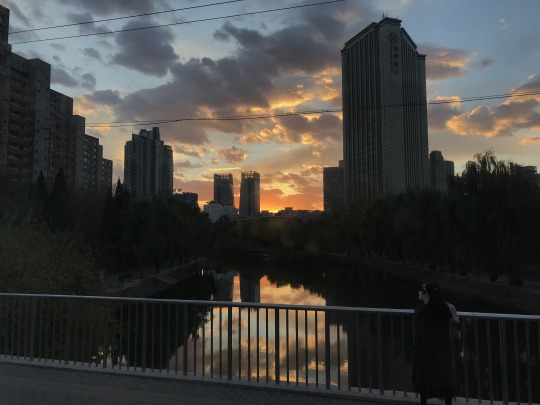
Especially after a whirlwind of a week starting my new job at Yili.
But lucky me, I got to take a “business trip” back to Beijing for a long weekend.
On Saturday morning, October 27, I got off the overnight train at Beijing Railway Station.

I slept for nearly the entirety of the nine and a half hours, and was ready to load my Saturday with friends and fun.
I made my way through the throngs of people outside the station, and onto to the subway headed to my hostel in Sanlitun. Beijing was considerably warmer than Hohhot – so walking the final 1000m stretch in all my layers with my bloated backpack was a tiring!
Yoga House, Beijing was where I stayed. It is absolutely STUNNING. The owners converted their two-story corner apartment in Yongli Plaza to a yoga hostel! The views over the Workers stadium, of GuoMao business strict, and along Gongtibei Lu towards the mountains west of Beijing was to die for. I definitely made the right choice.

I took a truly lovely, much needed shower, and was back on the road. This time, headed to Dennis’ rugby match out by the airport. I biked to the airport express, shot over to the airport, then took a taxi to the pitch at Dulwich International School.
It was the perfect day for rugby – blue skies and crisp autumn sunshine.
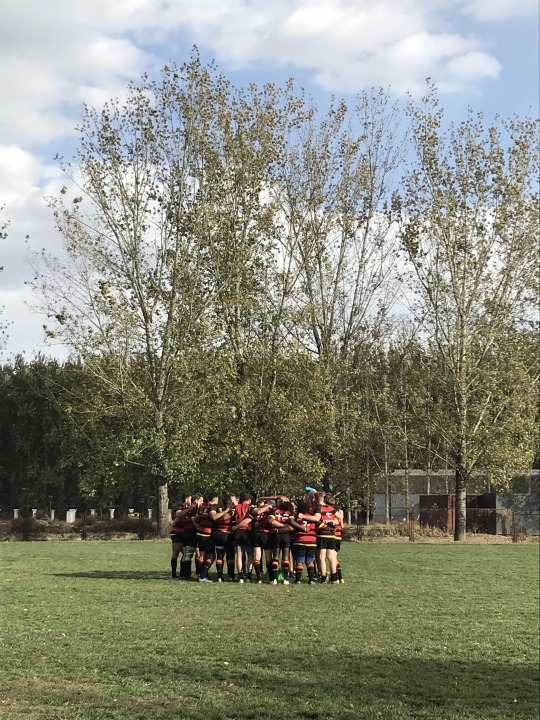

Dennis’ team, the Beijing Devils, pummeled the opposing side. No surprise. They’re the best team in Beijing. This was the third time I saw them play. The first time was in Beijing October 2016 when I came up from Nanjing to visit, then in Shanghai December 2016 when I popped over from Nanjing to join their tour (SO MUCH FUN – I’m talking lots of rugby, lots of beer, lots of players accepting awards with a make-out, lots of tour virgins in drag, lots of superhero costumes, and ME). You could say I’m a pretty committed fan.
Anyway, after the match we took the team bus back to the city, and went to Dennis’ apartment to freshen up before going to the team’s bar, Schillers, for their pub quiz that night.
Coincidently, the joker cards during the quiz were from the Shanghai 2016 tour – and our card was Frazier, whose virgin-drag outfit I helped fix that night. He was Beautiful, and I remember so clearly at the rugby match awards dinner him singing Can You Feel the Love Tonight from the Lion King – winning the praise of the ladies and NOT having to strip naked.
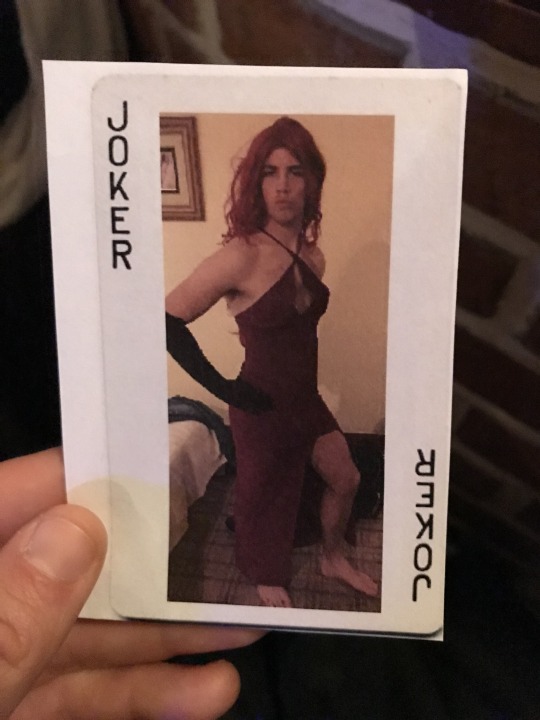
So trivia was great! But as midnight came around, I was insanely exhausted. I walked like a zombie the wrong direction home for 20 mins before realizing it, then had to walk all the way back home. It should’ve been a 15-minute affair. My eyes were about to fall out of my face. I made it home and crashed HARD.
Sunday I decided to sleep in and rest. After all, it was my first real break day after getting back to China, period!
For lunch, my friend from uni, Yasser, picked me up and we went for Turkish doner and coffee in Sanlitun. YUMM!

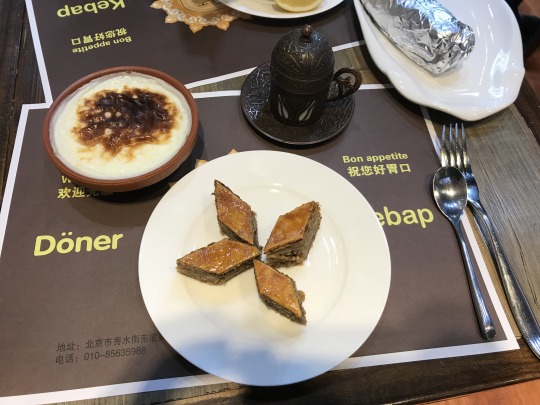
After we parted, I went on a nice walk around Sanlitun. Lots of fun things to see.


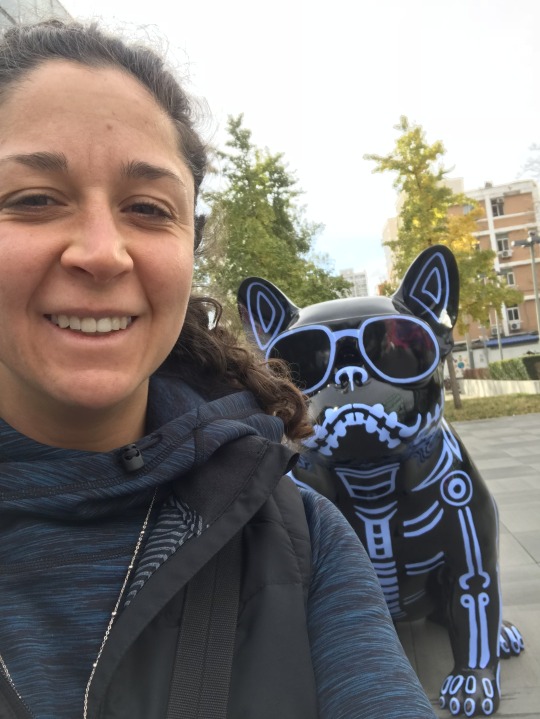


I went back to Yoga House and was treated to a beautiful panorama sunset. The clouds !!!! Amazing.
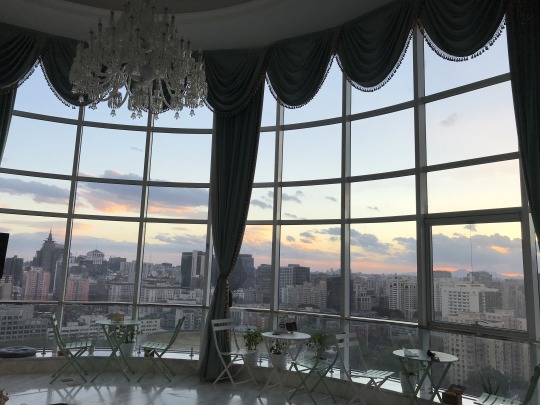
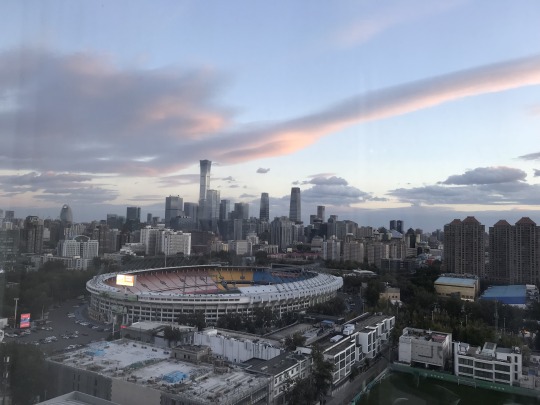
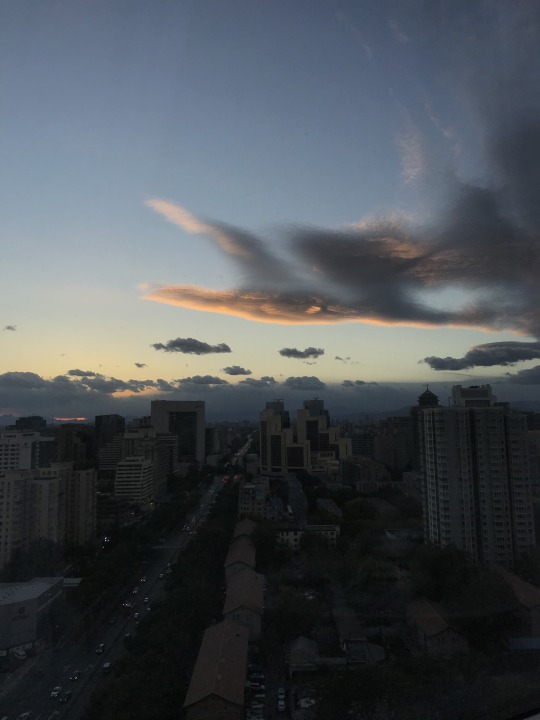
After taking in the views, I biked over to Guomao to have beers with Ricky at BeerSmith. It was definitely more upscale, but not as good as Slow or Great Leap.
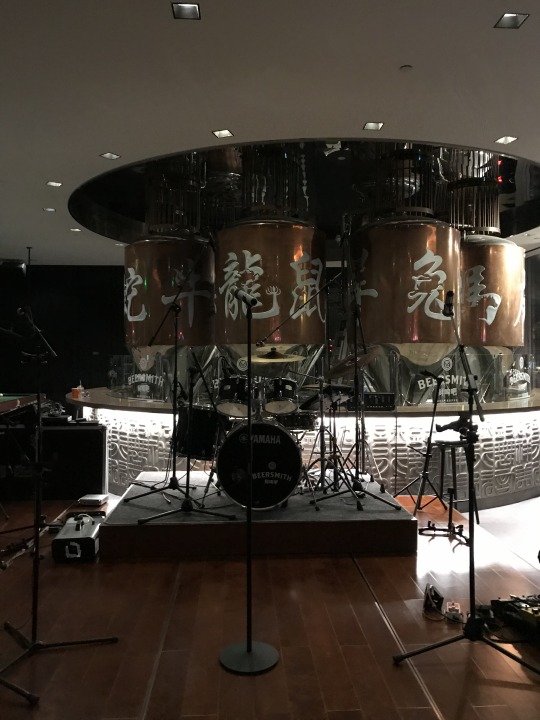
It’s in the China World Mall, across from the CTV Tower, aka Pants building.
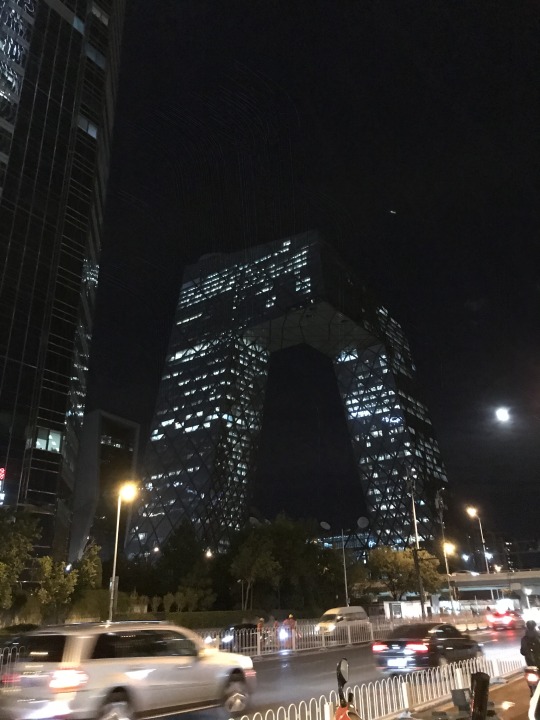
It was nice seeing Ricky! He’s a traveler like me so we can talk forever, but we were smart and didn't stay out too late.
Monday morning I literally rose with the sun. When I walked downstairs the sunrise before me was absolutely incredible. And I had all the views to myself. So SO so so SO beautiful.
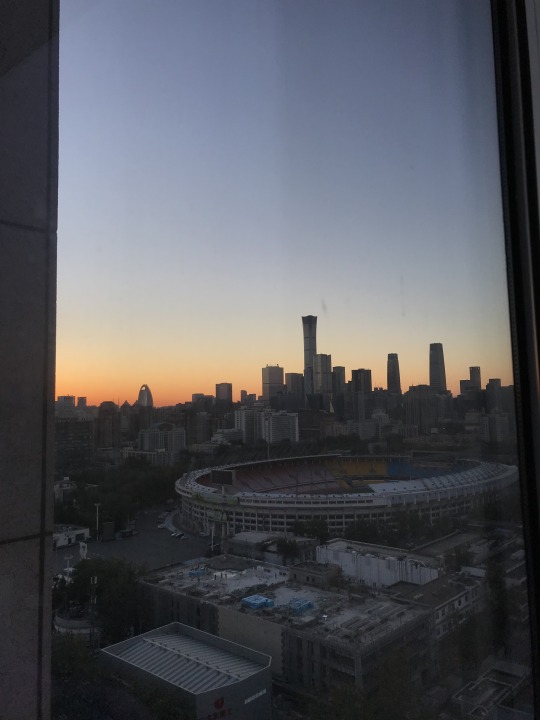
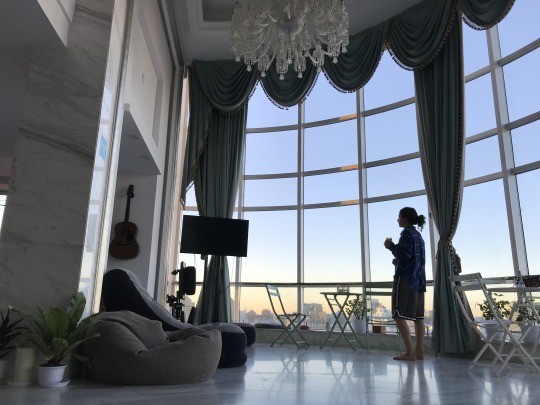
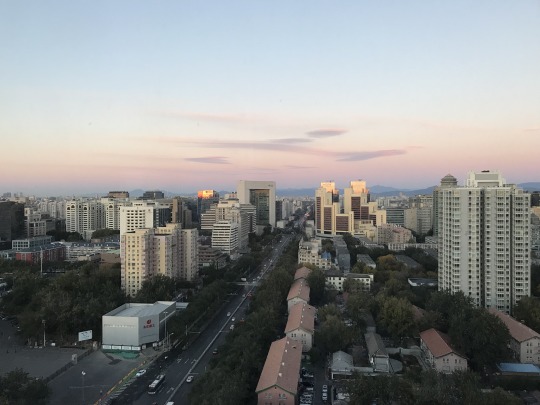
Once the sky reached a uniform calm blue hue, I curled up with my book for some morning reading.

At 11am I was scheduled to go to Slow Boat Brewery, where I interned the year before, to hang out with my former boss, Chandler, and the master brewer, Daniel. What I thought would be a few hours – I planned to go to the tea market after – turned into the WHOLE day! Daniel and I had such a great time chatting about so much random stuff. Around 1pm, we did a tour of the brewery with the Chengdu brewers that were in town – so that’s when the beers started flowing. After that, Daniel had me sample a lot of their new beers, and we eventually made our way to the roof to bask in the sunshine. It wasn’t until 4pm that we decided it was time to go home. Some take-aways: baby cows are like puppies, terroir, darker teas actually have MORE caffeine than the lighter colored ones, and Daniel needs to run a pub quiz. #Knowledge.
Afterwards, I went to LingErJiu for my very favorite youpomian – super fat noodles topped with pork, bean sprouts, bok choy, carrots, and of course hot chillies – and roujiamo – a shredded pork sandwich. YUM! It was delicious, but I also remember why eating it once a week last spring made me fat. Truth.

That evening, I had arranged for Dennis and Doc to meet. Dennis will assume teaching the Doc while I’m in Hohhot. At 6pm we met at Beijing Union Medical College for our lesson together. The Doc was delayed by an emergency surgery, so Dennis and I hung out with his assistant, who likes to go by the nickname Little Shrimp. She’s adorable.
The Doc finally joined us. He and Dennis really hit it off! Dennis actually knows a lot of anatomy owing to his rugby life. We chatted about the Doc’s upcoming conference and made great progress!

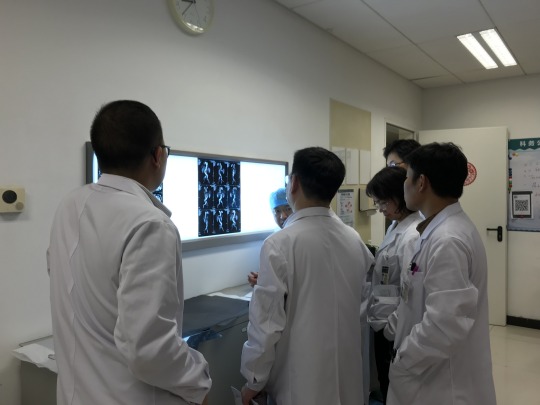
Around 8:30pm we left the hospital with Little Shrimp, and two of the doctors colleagues for some beers and light snacks nearby. It was a fun time!
Afterwards, Dennis and I hopped on some OFO bikes, which were all broken by the way, F U OFO! But we finally found properly working ones. Dennis and I were headed the same direction and had a great chat biking home! Love him!
It was late when I got back, and I hit the pillow hard in anticipation for a working day.
Tuesday morning I woke early to prepare to head down to Yili’s office in the southern-eastern quarter of Beijing proper. The morning was packed with presentations given by group that was just finishing up their training period.
The 60 trainees were divided into 8 teams that had to come up with ideas about new marketing and sales strategies for given Yili products. The groups all did great jobs, and really got to showcase their creativity. One group wanted to pitch a new yogurt product as a cure for spicy and oily hotpot. Another group wanted to link soybean milk to beauty of traditional Chinese small towns. I was impressed!
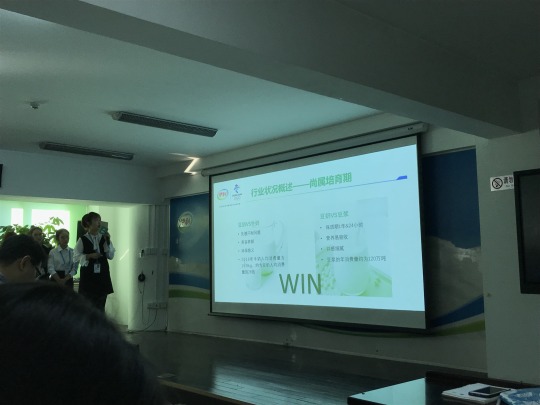
For lunch, we went to the basement cafeteria. It’s very interesting how basically every office building in China has a food court. I think on one hand it’s convenient, but on the other hand, it’s too closely integrating work/the work place into break time. There’s not a great division between work and private life here in China.
After lunch we went back upstairs for the afternoon program. We watched a video about Yili’s culture.... which is part comical and part infuriating.

Basically, the video was a compilation of professional speakers talking about “Yili Spirit.” One Yili delivery man left his family behind in Shanxi province, to travel 4000km to deliver Yili’s milk to families in need. He persevered despite wind and rain and cold – to get that milk to its destination! Yili Spirit!!!!! They even played “You Raise Me Up” during the presentation...
Then there was another speaker who literally showed a picture of a rainbow and discussed how there’s beauty after a storm, just like how if you work hard, you will create beautiful things!!!!!! Omggggggggggggg!!!!!!! I laughed a LOT. But also WTF.
When the onslaught of ridiculousness finally stopped, we had some free time before the dinner party in the evening.
ZhenZhen and I headed over to the Panjiayuan Antique Market. It was way cooler than expected! There was a whole slew of traditional Chinese products, ranging from meditation walnuts, to porcelain, to paintings, to polished jade in every color you could imagine.
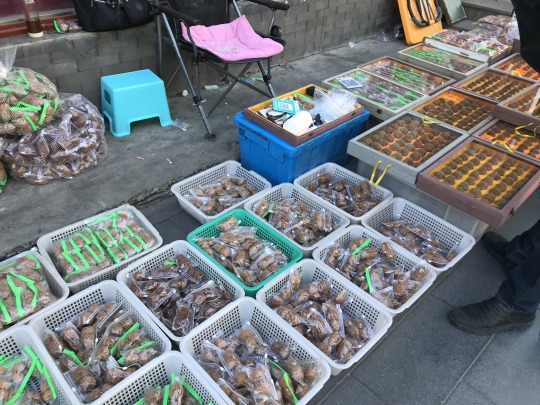
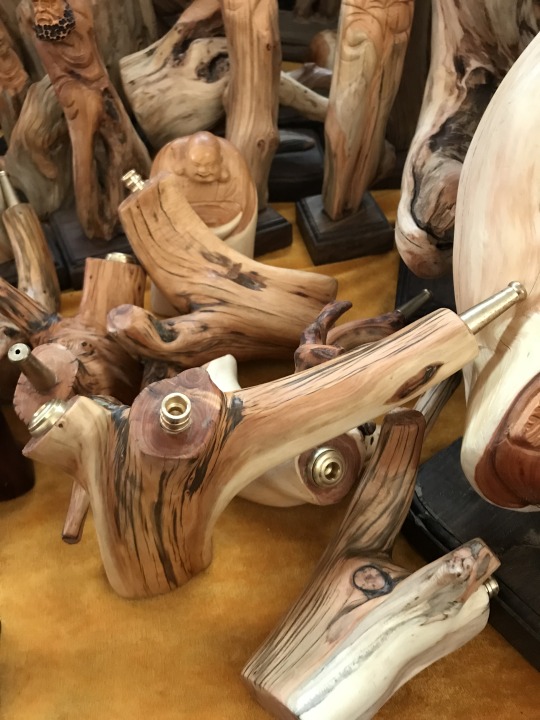
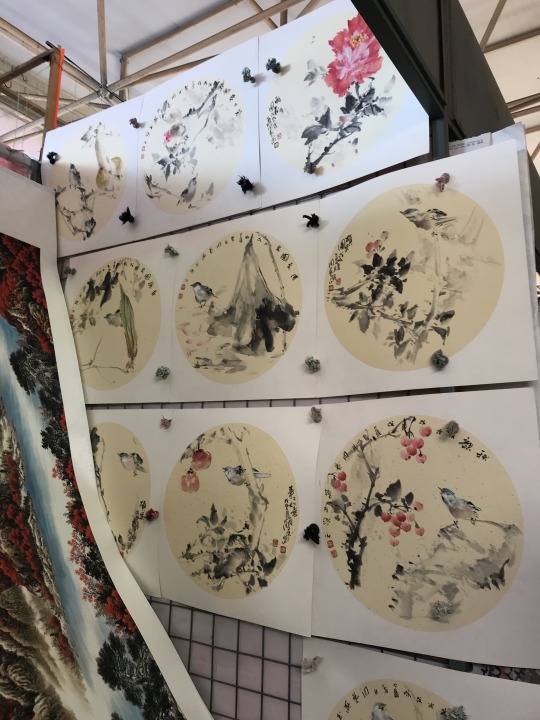
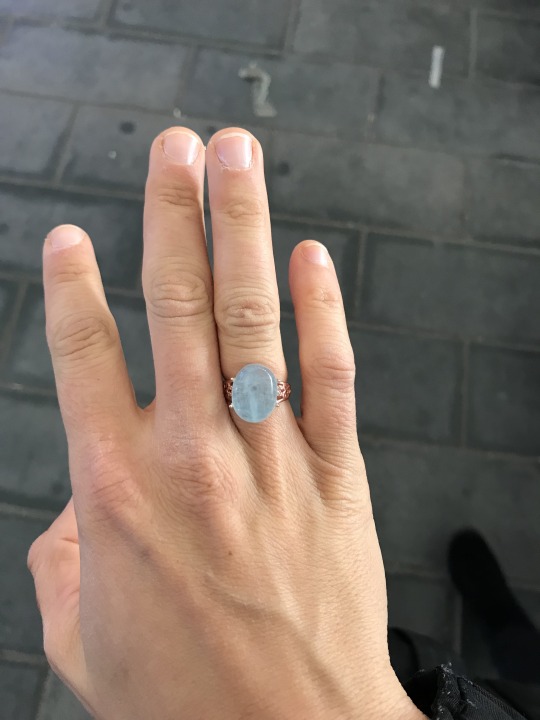
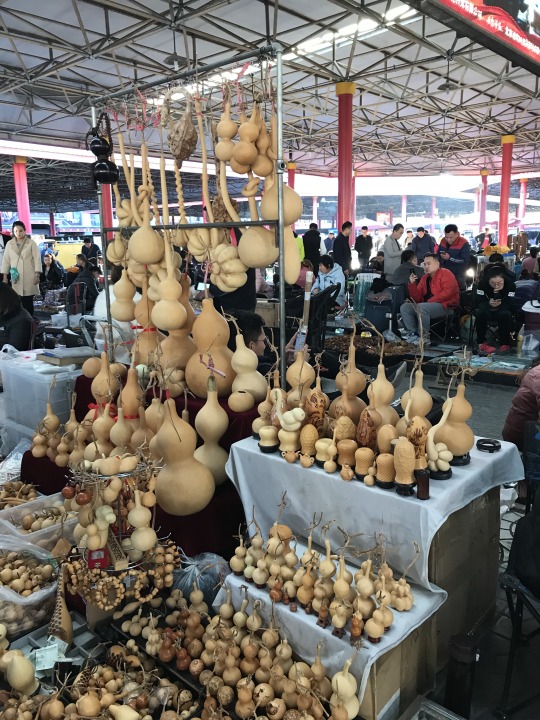
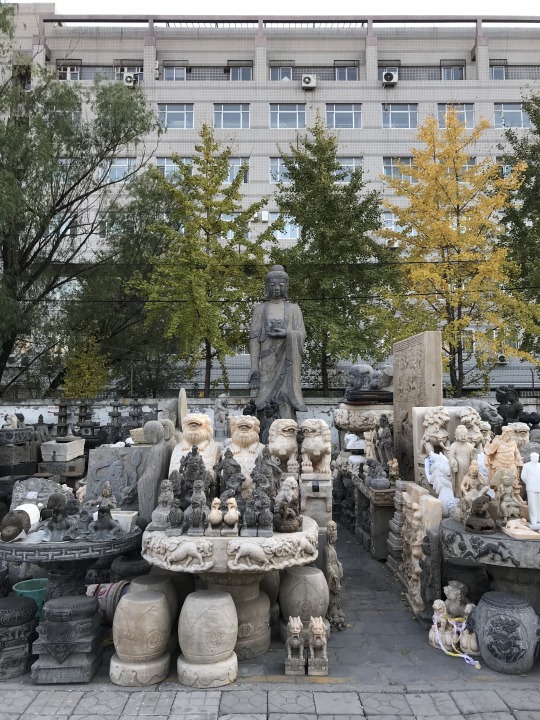
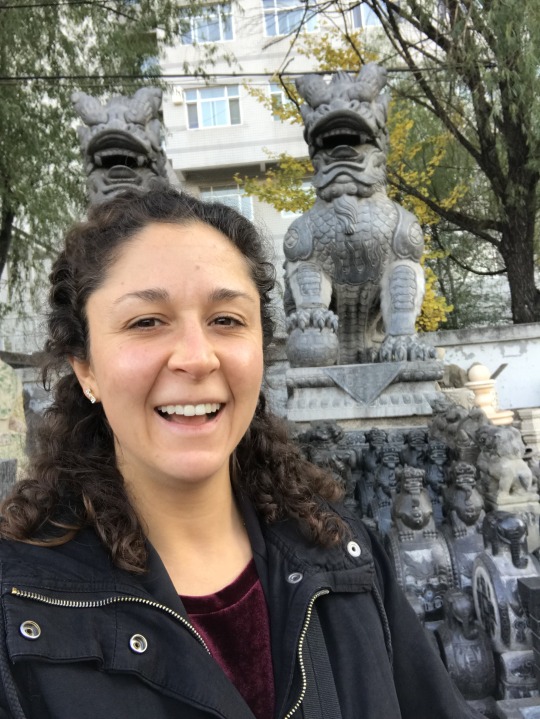
I LOVED it! I now know where to go to furnish my apartment in Beijing when I finally move there in mid-January.
At 6pm we joined the festivities. It was an evening of good food and good company. Each of the small groups had made up some song or dance. SO CUTE! Then there were some people that sang or danced individually. All in all, everyone was SO talented!!! I was really really impressed and humbled.
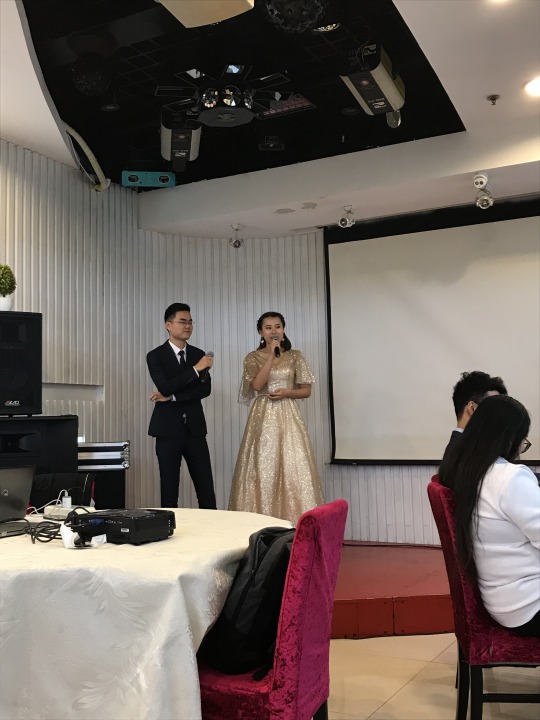
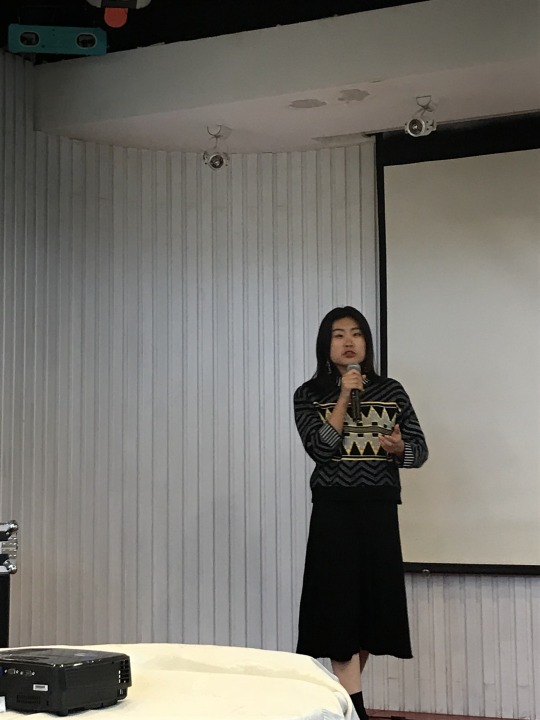
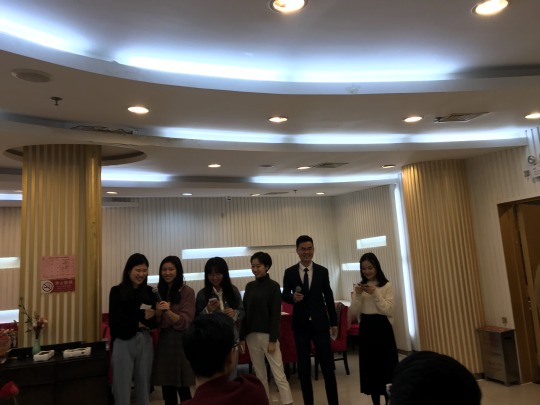
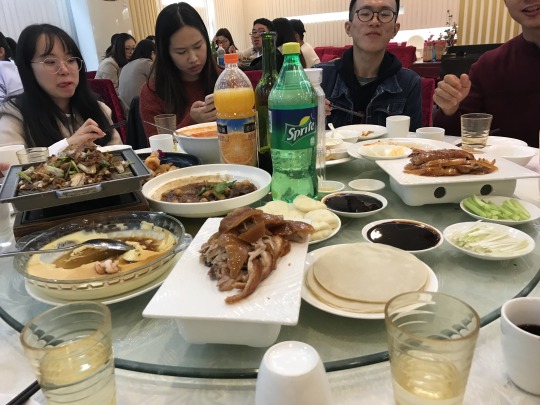
I love this aspect of Chinese culture where everyone is so supportive and ready to showcase their abilities. It’s very common at dinner parties to celebrate with their talents, good food, and many many toasts where everyone stands to chink glasses and even move around to different tables to toast with everyone. Why don’t we do that at dinner parties in Western culture? It’s great! I’m going to make it happen.
When the festivities ended, everyone said their teary, semi-drunken goodbyes – the training program was over for that group and some were headed down to the Shanghai branch.
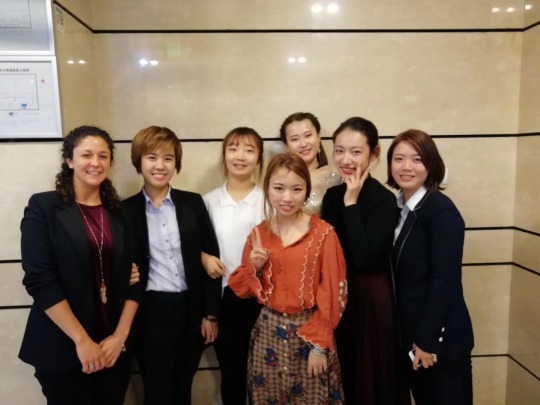
Around 9pm I hopped onto a bike to make my way up to Beixinqiao to meet Berit for some beers. It took FOREVER on the 3rdring road. Ugh. But finally I made it.
She took me on her scooter over to Side Street, formerly known as Ron Mexico. Who did we see outside, but Ian! My former classmated from UIBE, and Tom’s best bud besides yours truly. What a coincidence!
Then two of Berit’s friends also met us, and we grabbed a table. There was a pub quiz in progress, and we joined the last round – music! Sexual Healing and Biggie Smalls made an appearance. Good times! I did a lot of heckling.
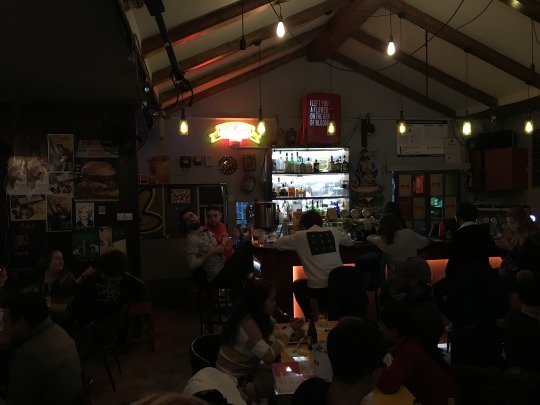
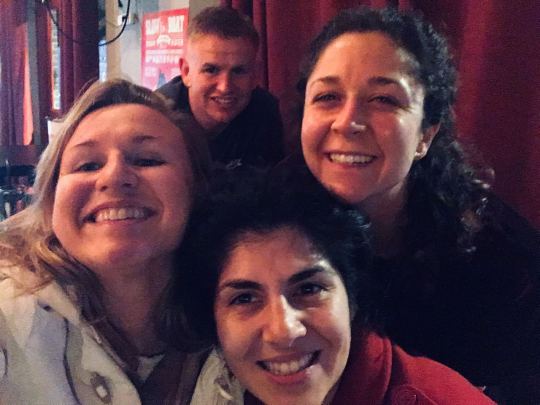
Then the four of us went over to Great Outdoors. It’s a hiking/outdoorsy themed hutong bar nearby. Very very cool vibes! By midnight, I was falling asleep so Berit drove me home on her scootie! WEEEEEE!! Riding with friends on scooters in Beijing is one of my favorite things. I absolutely love biking, but you can’t go two or three people on one bicycle. Scootin in Beijing is love.
When I arrived back at Yoga House, I promptly hit the pillow.
The next morning, Halloween!, I rose early-ish because at 9:00am I had to make my way over to Beijing West Railway station for my 11am train back to Hohhot. First I walked around to pick up snacks for the nine and a half hour train ride, then I headed out. First I biked to Chaoyangmen, then hopped on the subway. Beijing West is quite far away with a transfer in the middle, but I made good time.
On the train I alternated between reading, sleeping, and snacking. The time passed in a cinch. One complaint about the slow trains in China, however, is that everyone smokes in-between the cars. The smoke stays trapped inside. I hate being smoked-out on the train. Otherwise it’s quite comfortable even in the hard-sleepers, where they give ample blankets and pillows.

SO, that was my first business trip that was 90% mini holiday with friends, and 10% business. I am so grateful !!!!!!!! I love Beijing, I love all of my amazing friends, and I love everything I’ve worked so hard to build during my time there that brought me HERE. To this crazy roller coaster ride of my first job.
Love all around!
0 notes
Text
Entrepreneurs cook up edible pot products despite legalization delay
VANCOUVER — Yannick Craigwell doesn’t need to guess how large the Canadian appetite will be for edible pot once it’s legal. He already knows — it’s huge.
The Vancouver entrepreneur whips up marijuana-infused cookies, brownies and fudge that he sells online through his company Treats and Treats.
“Once it becomes legal, I think the only thing that’s going to change is you’re going to get the people who were raised to think … ‘Weed is bad, it’s the devil’s lettuce,’ and they’re going to be open to trying,” he said.
“It’s not really anything to be afraid of, but we are stigmatized by the laws that we have on the books.”
Businesses across Canada are cooking up weed-laced goodies to prepare for their legalization next year. Companies are betting on a big market and hope to avoid some of the pitfalls seen in U.S. jurisdictions when edibles were legalized.
The only legal marijuana on Oct. 17 will be fresh or dried bud, oil, plants and seeds. The federal government has promised to develop regulations to support the sale of edibles and concentrates within a year and will launch consultations later in 2018 and 2019.
Canada’s cautious approach stands in contrast with Colorado, which had practically no restrictions when pot treats hit stores in 2014. The Rocky Mountain Poison and Drug Center received 87 marijuana exposure calls about children that year, nearly doubling the previous year’s total, though no children died.
The statistic grabbed headlines and pushed the state to introduce regulations in 2015. Edibles must now be contained in child-resistant packages, stamped with a universal symbol and divided into servings of 10 or fewer milligrams of THC, pot’s psychoactive ingredient. They also can’t be shaped like animals, fruit or people.
The dangers of edibles hit close to home last week when a young child on Vancouver Island ate pot-infused gummy bears. She was rushed to hospital in medical distress, RCMP said, but was expected to fully recover.
Health Canada is considering requiring a standardized cannabis symbol on labels and banning product forms, ingredients and flavouring agents that appeal to kids, said spokeswoman Tammy Jarbeau. Previously introduced regulations already require marijuana to be in child-resistant packaging.
The effects of edibles take longer to be experienced and last longer than those caused by smoking cannabis, she said, putting users at risk of overconsumption. And since edibles can look like normal food, there’s a risk that children and pets will accidentally eat them, she added.
“These two issues point to the need to control the amount of THC in edibles, as well as the need for measures to ensure that edibles are appropriately packaged and labelled,” she said.
It’s illegal for anyone other than a licensed producer to sell medical pot, but Craigwell said he operates in the “grey.” He requires online buyers to agree to terms and conditions that state they need cannabis for medical reasons and he also sells his edibles in dispensaries in Vancouver, where police have chosen not to crack down.
A standard dose of THC in Colorado is 10 mg, but Craigwell’s goodies range from 90 mg to 175 mg. He said he’s open to the government mandating a lower dose, but it should consider what customers want.
“All you’re doing is risking them going into the black market,” he said. “My business model won’t succeed if I don’t have customers.”
Craigwell advised first-timers to eat a small piece and wait to feel the effects.
“Start off with a quarter. Work your way up to a half, and then a whole,” he said.
Experts predict edibles will eat up a major chunk of the market once legal. Six out of 10 likely pot consumers will choose edibles, according to a Deloitte survey of 1,500 Canadians.
The format has less stigma than smoking, said Deloitte partner Jennifer Lee.
“We found that it was really a product category — baked goods, chocolate, candy, beverages, honey, (ice pops) — that is much more accessible,” she said.
Some companies are banking on alcohol-free cannabis beverages rising to the top of the pack.
The Coca-Cola Company has reportedly been in talks with Aurora Cannabis Inc. about beverages containing a non-psychoactive pot component. Molson Coors Canada teamed up with HEXO Corp. to sell marijuana-infused drinks, while Constellation Brands Inc., which makes Corona beer, invested $5 billion in Canopy Growth Corp.
Bruce Linton, Canopy’s CEO, noted it’s already common to socialize over a beverage.
“At five o’clock, do you want to meet for a gummy bear or a glass of wine?” he asked.
Canopy has developed calorie-free drinks that deliver a high within seven to 12 minutes, rather than the usual delayed onset of an edible, Linton added.
Province Brands CEO Dooma Wendschuh said his company has also created a way to speed up the onset of a high from its beers brewed from the cannabis plant.
But Wendschuh said developing a product prior to its legalization has its challenges. He can’t currently taste-test the beers in this country.
“It’s been absurd,” he said. “In Canada, we can make this product … but no one’s allowed to drink it.”
Companies in this story: (TSX:ACB) (TSX:TPX.A) (TSX:HEXO) (TSX:WEED)
— Follow @ellekane on Twitter.
from Financial Post https://ift.tt/2ym47O4
via IFTTT Blogger Mortgage
Tumblr Mortgage
Evernote Mortgage
Wordpress Mortgage
href="https://www.diigo.com/user/gelsi11">Diigo Mortgage
0 notes
Text
Simple English Word List
SIMPLE1540 : a simple English wikipedia word list
based on the XML export of all articles related to the nine major groups: Everyday life, Geography, History, Knowledge, Language, Literature, People, Religion, and Science and retaining all word forms appearing 7 times or more in this corpus. The total number of words in this corpus is well over the 100.000 words.
a A.D. ability able about above absence abstinence abstract academic academy accent accept access accord account across act action active activity actual actually ad add addition adherent adjective adult advance advice affect after again against age agnostic agnosticism ago agree agreement agriculture air alcohol all allow ally almost alone along alphabet also although always amateur amendment among amount an analysis ancient and angel animal annals anonymous another answer anthropomorphism any anyone anything aphasia appear apple apply approach archaeology architecture area argue argument around arrange art article artificial artist ask aspect associate association astronomy at atheism atheist atomic attack attempt attribute audience author authority available average avoid award away B.C. baby back background backpack bad bah balance band baptism base basic basis battle BCE be bear beautiful beauty because become bed bee before begin behavior behind being belief believe believing belong below best better between beyond bias biblical bibliography big billion biological biology birth bit black blind blood blue body book born both bottom boundary box boy brain branch bring brown buffalo build building bull burn business but by c. ca. calendar call can cancer canon capital caption car carbon card carry case cassette cat category cathedral catholic cause cell center central century cerebral certain change chapel chapter character chemical chemistry child china China choice choir choose chronicle church circumcise circumcision cite citizen city civil civilian civilization claim clan class classical cleanup clear clergy click climate close closer clothes clothing coast coauthor code codex cognitive col cold collection college colonization colony color column com come commentary commission common commonly communicate communication communion communist community companion company compare competition complete complex compose composer computer concept conception concern condition confuse confusion congregational connect connection conquer conquest consciousness consider consistent constitution construct construction contain contemporary content context continent continue contrary control convention conversation conversion convert cook cooking copy core correct could council country course court cover covered create creation credit crime critical criticism crop cross crust cultural culture current currently daily damage dark data date day dead death debt decadence decadent decide declaration decline deconstruction deep define definition deity demonstrate denomination department depth describe description design detail determinism developed development device devil diagnosis dialect dictionary die difference different difficult difficulty diphthong dipstick direct directly dirt disagree disambiguation disbelief discipline discover discovery discussion disease disorder distance distinct distinction distinguish distribution divide divine do doctor doctrine document dog don't door down Dr. dream drink drown druid due during dynasty each earlier early earth easier easily easy eat economic economics economy ed edge edit edition editor education effect eight either electric electricity electronic element elevation else emperor empire encyclopedia end energy engine engineering enlightenment enough enter entertainment environment environmental epic episode equal era error especially establish etc. etymology even event eventually ever every everyday everyone everything evidence evil evolution evolve exact exactly example except exchange exist existence expansion experience experiment expert explain explanation express expression external extinct face fact failure fair faith fall false family famous far fast father feature feel feeling female feudal few fiction field fight figure file find finding fire first fish fit five fix flow folk follow food for force foreign foreskin form formal former fortune fought foundation founded four fourth frame framework free freedom frequently friend from front fruit full function functional further future gas general generally generation genre geographer geographic geographical geography geology geometry germ get give glass global go god gold golden good government grammar great greatly green ground group grow growth guide guillotine hair half hall hand handbook handicap handle happen happens happiness happy hard have he head heading health hear heat heaven help hemisphere her here heritage hero high highly him himself his historian historical historiography history hold holy home homo hope hot hour house how however human hundred hunter hypothesis hysteresis I ice icon idea identify identity if illiteracy illiterate illusory image importance important impossible improve in inc. incense include increase indeed independence independent indigenous individual industrial industry influence information inquiry inside instead institute institution instrument instrumentation intellectual intelligence interlinear internal international internet interpretation into introduce introduction invent invention involve iron island issue it IT itself job join journal journalism judge just keep key kill kind king kingdom know knowledge la LA label lack lake lamp land landlocked landscape language large last late later law lead leader leap learn learned least leave legacy legal legend let letter level lexeme library life light lightning like likely limited line linguistic linguistics link liquid list literacy literary literature little liturgy live local location logic logical long longer look lord lore lose lot love low lower mac machine magazine magic magnetic magnum mail main mainly major make male mammal man mankind manuscript many map march March mark market mass material mathematical mathematics matter may May me mean meaning meant measure measurement meat median medical medicine medieval mediterranean medium meet member memory men mental mention mercury message metal method mid middle might migrate migration military millennium million mind minister minute misconception miss model modern modernism modernist moment money monologue monophthong month monument moon moral morality more morning most mostly mother mount mountain mouth move movement much museum music musical musicians must my myth mythology name narrative nation national nationality native natural naturalism naturally nature near nearly necessarily necessary need negative neither neologism network neurogenesis neuron neuroscience never new news newspaper next night nine no non none nor normal normally not note nothing noun novel now nuclear number object objective objectivity observation observe occupation occur ocean octane of off offer office official officially often oil old older on once one online only open opera opposite or oral orbit order org organization organize origin original originally orthography orthology other others our out outer outside over own oxygen p. pack pagan page paint palace paper paradigm parent parish park part participant particular particularly party pas pass past pasta pattern pay peace peer penguin penis people per percent percentage perception performance perhaps period peroxide persecution person personal personality perspective persuasion pet phenomenon philosopher philosophical philosophy phoneme phonetic phonetics photo phrase physic physical picture piece pilgrimage place plan planet plant plat plate play please poem poems poet poetry point pole police policy political politics polytheism polytheistic popular population position positive possession possible possibly post power powerful pp. practical practice praise pray prayer precise predict prediction prehistory present preserve press prevent priest primary principle print printing private probably problem process produce product production professional program project pronounce pronunciation proof property prophet propose prose proselytism protection protein provide province psychological psychology public publication publish publisher publishing punishment pure purpose put pyramid quantum question quickly quite quote race racial rack radiation radio rain range rate rather read reader real realism reality really reason receive recent recently reclamation recognize record recreation red ref refer reference referred reform reformation regard region reign rejection relate relation relationship relatively relativity reliable relic religion religious remain remember remove renaissance replace report republic request require research researcher resource respect response result resurrection retrieve return revelation revert review revision revival revolution rhetoric rich right rise ritual river rock role room royal rule ruled ruler run rural sacred sacrifice safe saga sage saint salad same sample satellite saw say schizophrenia scholar school science scientific scientist scope sea search second secondary section secular see seek seem selection self sense sent sentence separate sequence series service set seven several sexual shall shaman shape share she short should show shrine side sign significant silence similar simple simply since single situation six size skill skin slavery sleep slightly slow small smell smith snake so social society sociology soft soil solar soldier solid soliloquy some someone something sometimes song soon sortable sound source space speak speaker special specie specific speech speed spell spirit spiritual spirituality split sport spread square st. stage stain standard star start state statement station statistic statistical statue status stick still stone stop story strange strap strong structure struggle stub student study stutter style subject successful such sugar suggest sun sung sunlight superior superiority supernatural support suppose supreme sure surface survey surveyor sushi sustainability sustainable sweat symbol symbolic system table take talk tam tan task teach teacher teaching technique technology tectonics teeth tell temperature template temple ten term terminology territory tertiary test testament text textual than thank that the their theism them themselves then theology theoretical theory therapy there therefore thesaurus these they thick thing think third this those though thought thousand three through throughout thumb thus ticket tight time title to today together toilet tolerance toleration tongue too tool top topic total towards tower trade tradition traditional train translation transport travel treat treatment tree trench trial tribe tried trig true truth try turn twentieth twenty two type typical typically ultimate ultraviolet under understand understood union unit united universal universe university unknown unsortable until up upon upper urban urbanization usage use useful usually valley value van vandalism various vassal vegetable verb verbal verse version very video view violence virgin visit vitamin vocabulary voice vol. volume vowel vs. wale wall want war warm warmer wash waste water wave way we weak wealth wear weather web website weight well what when where whether which while white who whole whom whose why wide widely wild wilderness will window wisdom wise witch witchcraft with within without witness woman word work worker world worship would write writer writing wrong yam year yellow you young your
China, March and May made this list because china, march and may are on it and I didn't want to decide in favor of the common noun or the proper noun; all other proper nouns have been omitted (even the ten other months that met the criterium of appearing more then 6 times).
#SimpleWikipedia #SimpleEnglish #wordlist #English #words #level1540 #Inli #nimi #selo1540
0 notes